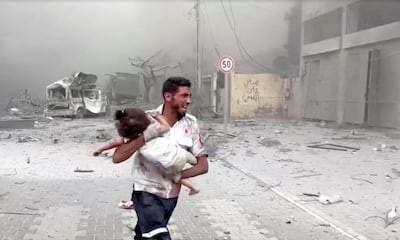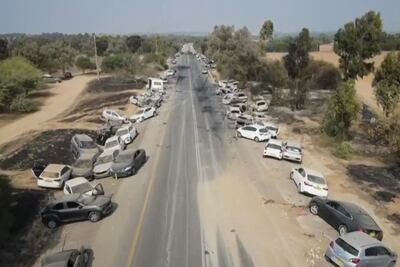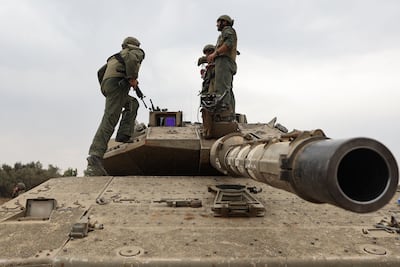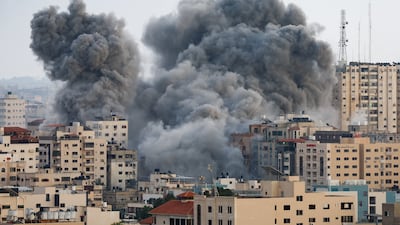Live updates: Follow the latest news on Israel-Palestine
Experts have warned a major military offensive in Gaza could result in an “escalation spiral” fraught with dangers that Hezbollah, West Bank factions and Iran would be tempted to enter into a region-wide conflict.
While in past Gaza operations punitive action by Israel had eventually been halted by international pressure, Sam Cranny-Evans of the Rusi think tank on Monday argued “they're not going to stop in this operation until they consider it militarily complete”.
Israel would be pursuing “maximalist goals”, meaning “we can reasonably assume that they're not going to be put off by casualties and the nature of the fighting will be violent and prolonged”.
With tanks and heavy artillery assembling on Gaza’s border, the likelihood of a ground operation in the coming days is increasing. A colleague of Mr Cranny-Evans, Dr Tobias Borck, predicted the Israeli government was gearing up for large-scale retaliation after Hamas orchestrated a multipoint incursion into Israel early on Saturday.
“Israel has an incredibly capable military but this going to be very, very costly and will come down to the political will of the Israeli government on how far are they willing to go,” said Dr Borck. “We'll see a pretty extensive military operation over the next few weeks on an order of magnitude bigger than previous rounds of fighting in Gaza.”
“If it is incredibly bloody with high cost in life, that could force the hand of other groups to take action and an escalation spiral leading to a multifront war.”
But Dr Borck insisted the current conflict concerned “Hamas, Gaza and Israel” and was not entirely about the “shifting geopolitical plates within the Middle East”.

Maximalist goals
“How many casualties are they willing to sustain in the ground invasion and a potential occupation?" he asked. "But the Hamas attack was unprecedented and is the stuff of national trauma.”
While it will be complicated by the estimated 130 Israelis taken captive, “the deterrent factor of holding hostages goes only so far”, he added.
Mr Cranny-Evans agreed the Israeli armed forces, which has 170,000 active personnel and 465,000 reserves, has the capability to take over Gaza, particularly with its advanced fire-control systems now enhanced by AI.
“But urban warfare is very difficult and tends to level the playing field,” he added. “If Hamas really digs in, the Israelis will have a long, hard fight.”
One pressing factor not yet settled for the analysts was the prospect of a two-front war. With Hezbollah weakened by Lebanon’s fragile economy and Iran currently seeking rapprochement with Gulf states, there are balancing considerations for the major players involved.
An Israeli source said it was expected Hezbollah would “throw a few bombs and missiles but they're not going to [launch] a wholescale war”.
However, it remains almost certain the Israeli-Hamas conflict is going to lead to a significant rise in deaths as Israel prepares for a major assault on Gaza.
The source linked to Israeli intelligence has told The National “hundreds of thousands” of reserves have been mobilised ready to enter the territory for combat operations that will not stop before “a meaningful retribution has been delivered”.
“A ground incursion is an absolute minimum,” said the Israeli source. “It could even be a full reoccupation.”
Michael Stevens, a UK analyst on the Middle East, agreed the operation would “go on as long as the Israelis deem it's necessary to go on” and that there would be significant civilian casualties.
“This is going to get very bad and it's going to get a lot worse before it gets better,” he added.

Netanyahu’s future
The depth of anger, particularly following the slaughter of more than 260 young people at the Supernova rave, had led to some Israelis “sending Gaza back to the Stone Age”, the Israeli source said.
But other argued that hardline policies towards the Palestinians orchestrated by Benjamin Netanyahu’s government of right-wing Jewish orthodox parties had contributed to the attacks and intelligence failings.
“Mr Security, aka Benjamin Netanyahu, has overseen possibly the worst single failure in the Israeli Defence Force's history,” said Mr Stevens.
An investigation into the failings of Israel’s prominent security service will tale place once the war is over, analysts said.
It appeared that Mossad and Shin Bet, the two leading Israeli intelligence agencies, had become “complacent” and too focused on the West Bank, Iran and Hezbollah, said Dr Sunam Vakil, of the Chatham House think tank.
“They did not anticipate that Hamas would be able to even engage in such a brutal way,” she said. “Hamas also took advantage of the domestic crisis in Israel” over reform of the constitution and the judiciary, she said.
“Netanyahu will go down in the history books, not just for being Israel's longest-serving prime minister but the one that missed it while he was focusing on his own domestic-corruption preservation tactics and will be tainted forever."
The Israeli source, meanwhile, said “heads will roll” in the intelligence service “but nobody's going into the details at the moment at any level”.
It was suggested that Hamas’s sophisticated operation escaped detection by Israel’s advanced electronic eavesdropping by planning it through word of mouth, said Brig Ben Barry, a former British army officer and urban warfare specialist.
“No electronic surveillance system is going to pick it up if they did not send text messages, emails or make telephone calls.”

Refugee exodus
A Gaza invasion would also certainly precipitate an exodus of refugees from the two million people living there, applying further pressure on Egypt and with the threat of a “cascade of migration fears to Europe”, said Dr Vakil.
It is also likely that after a decade of civil war, Syrian President Bashar Al Assad will want to stay away from the conflagration. “He can publicly condemn Israel's atrocities and behaviour and draw attention to the Palestinian occupation but he will not be looking to pile in,” said Dr Vakil.
She added that while Iran supported Hamas, it might want to “sit this out” and reap the economic gains from the recent reconciliation with its Gulf neighbours.
But she warned the “Iranians like to make lemonade out of any sort of lemon” and “there might be opportunities and certainly risks for Tehran”.


